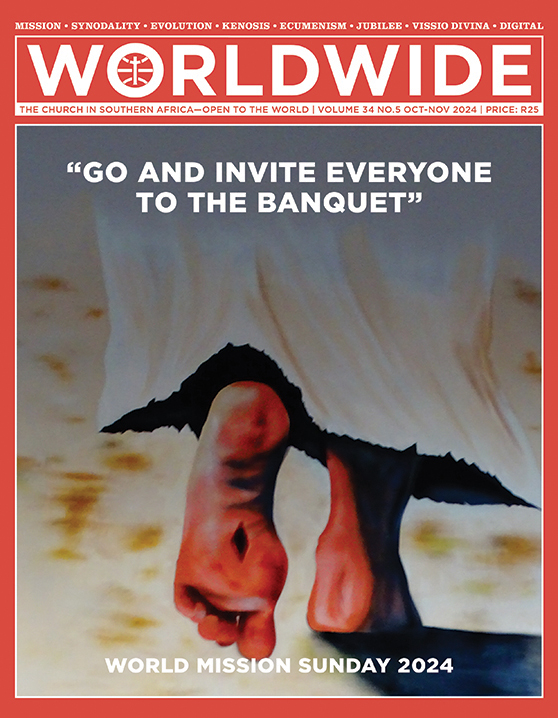
“GO AND INVITE EVERYONE TO THE BANQUET”
The image represents the feet of the Risen Jesus, in motion, showing the wounds of his Passion, yet ready to reach out and invite all to the banquet of his mercy. Likewise, Jesus invites to us to his mission in co-responsibility to bear witness to the power of his resurrection and to bring Jesus’ message of peace and fraternity to the whole world.
SPECIAL REPORT • MISSION IN AFRICA TODAY

KENOSIS AS FOUNDATION FOR THE PROPHETIC MISSION IN AFRICA
Kenotic humility and transformation of the reality are two pillars on which missionary activity should focus in an African context. The author sees them as integral in witnessing to the Gospel on the continent today.
BY FR JONES KAWISHA, M.AFR. | ST JOSEPH’S THEOLOGICAL INSTITUTE, CEDARA, KZN
MISSION, ENTRUSTED to the Church, can be defined as an effort to make everyone experience and share God’s love (DM, § 9). However, on a theological level, it is a more complex and multi-faceted reality. The Church is missionary by her very nature (AG, § 2). Throughout my years of studies, I have come to understand mission as being an exercise of kenosis, since Christian love is ultimately kenotic. Kenosis finds its full expression in the incarnation, the absolute expression of God’s hospitality towards humanity. Hence, the prophetic mission in Africa today must be understood from the perspective of hospitality and kenosis.
Kenosis
Philippians 2, 5-11 is, according to Dawe (2011:26), “the locus classicus of all kenotic thought.” Different New Testament scholars have tried to interpret this passage from a variety of Christological and ethical stances which are inherently linked to one another. Phil 2:5-11 illustrates an example of humility (humbleness) and makes an appeal to Christians to imitate Christ’s kenotic way of being. This interpretation is mainly based on v.5, which portrays Christ as an “exemplum ad imitandum,” a true example to imitate (Martin 1997:71). He is the very embodiment of humility (Cornille 2008:15), who guides Christians in their way of being in the world. From this perspective, humility is essential to the Christian understanding of mission and of being in the world, where interconnectedness and hospitality are constructed.
Prophetic witness in Africa
In humility, we can discern God’s mission and be prophetic witnesses in Africa today. Africa is now facing two serious challenges: abject poverty and the increase of religious extremism. The poor are becoming poorer, and the rich, richer. The middle class (the normal economic backbone of modern society) is being slowly eroded in most African countries. Corruption has become an everyday reality. The structures intended to fight it, including religion, are also being compromised. The prevalence and normalization of corruption make it difficult to truly discern God’s will, read the signs of our time, or effectively engage in what should be the mission’s activity in today’s context. Religious extremism is rampant in African countries like Mali, Burkina Faso, Nigeria, Mozambique, etc. Several factors are triggering it, such as poverty (caused by the manipulation of a group of people ultimately for economic gain), and ignorance.
Africa is now facing two serious challenges: abject poverty and the increase of religious extremism.
Gobbo (2016:75) highlighted that: “Human beings are authors and sources of tensions, conflicts, injustices, oppressions, nepotism, dictatorship, etc. Human society is full of discrimination and segregation on the basis of race, gender, social status, political ideology, religious beliefs etc.” What is then the prophetic mission of the Church in an African context? Although preaching is essential, it is not the only model of mission and, possibly, not even the most effective in meeting the spiritual needs of Africans today.
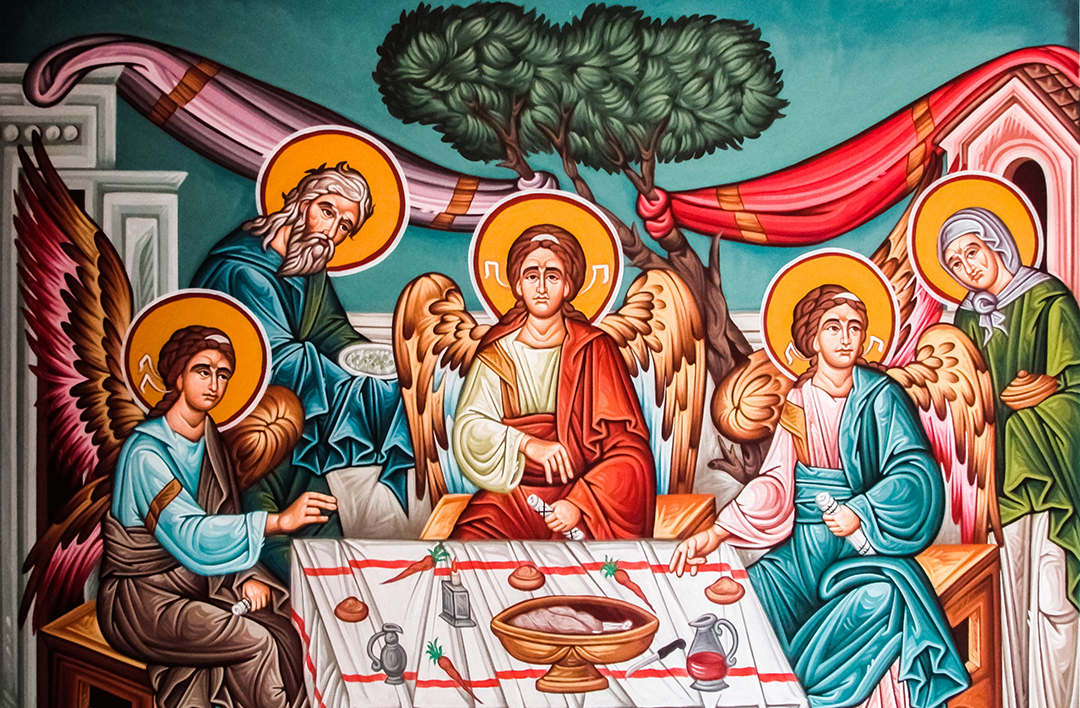
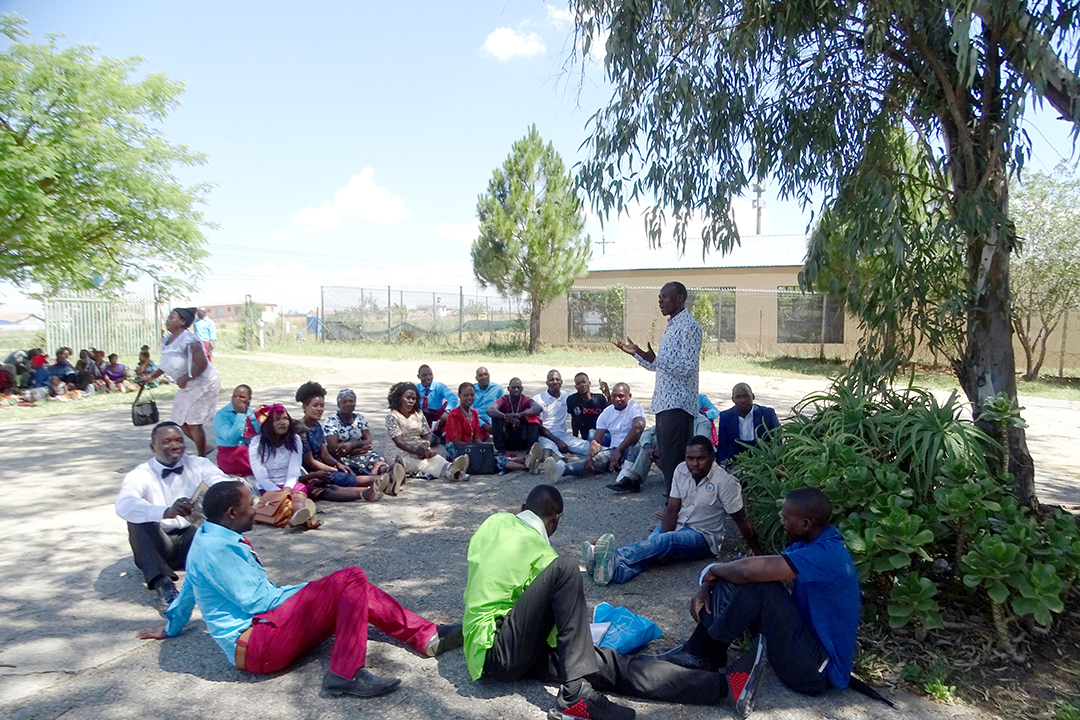
The problems Africa faces are clear signs of a lack of interconnectedness and hospitality, of resistance to a prophetic witness, and, ultimately, to God’s Spirit. This broad-based social disconnection leads to abuses of power, disobedience, retreating into comfort zones, exploitation of others, egoism, and spiritual self-sufficiency. Contrary to this, reliance on God’s Spirit gives us the courage and the assurance to participate in the mission of Jesus Christ; the Church becoming a prophetic community which pursues God’s will, namely witnessing salvation in Jesus Christ, in the midst of Africa’s multiple challenges.
The African Church must provide witness to transformation, which comes from fully listening to God’s Spirit and which leads her to spearhead an integral renovation of the African people
The African Church must provide witness to transformation, which comes from fully listening to God’s Spirit and which leads her to spearhead an integral renovation of the African people in their political, social, economic, and spiritual spheres. From an African perspective, the mission of the Church will be seen as authentic and prophetic if it targets all oppressive conditions and repressive political, economic, social, and religious systems. Jesus was never indifferent to the suffering of his people; consequently, in being prophetic, the Church must deal with poverty, corruption, dehumanizing conditions, and the exploitation of the poor in society. Often, the Church tends to cocoon itself in comfort zones. When oppressive structures are challenged, new life and hope are experienced together with a true sharing of Christ’s love. This is when the true prophetic nature of the Church is realised.
Jon Sobrino describes the task of liberation theology as a reflection on praxis, its locus theologicus being the poor of this world, and its goal “taking the crucified people down from the cross” (Rausch 2016:20). Mission must be a reflection of our fidelity to the Christ-Event which is existential and practical. Today, the Church in Africa participates in God’s mission in different historical, social, political, and economic circumstances. The mission of a kenotic Church calls for a reinterpretation and an actualization of the Christ-Event by, figuratively speaking, removing the crucified people of Africa from the cross and promoting justice and peace, dialogue with other believers, and the option for the poor. The Church must avoid making the poor poorer by indoctrinating them with a religiosity of eschatological happiness while remaining silent about their daily various forms of oppression. Christ has already inaugurated the Kingdom of God. Its values must be lived here and now as we move towards its eventual total accomplishment.
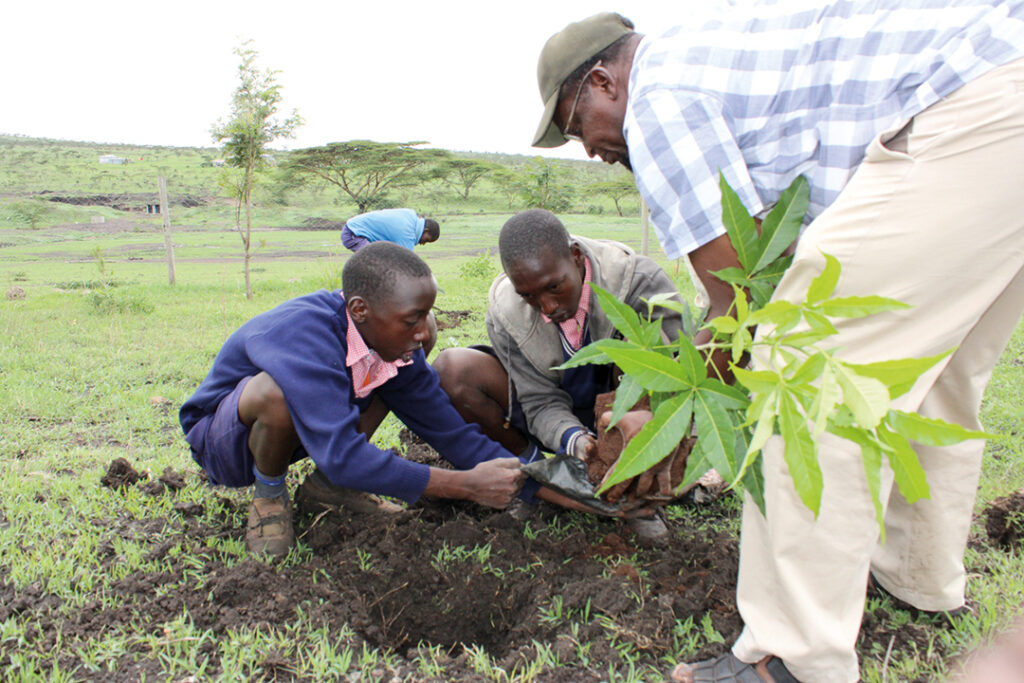
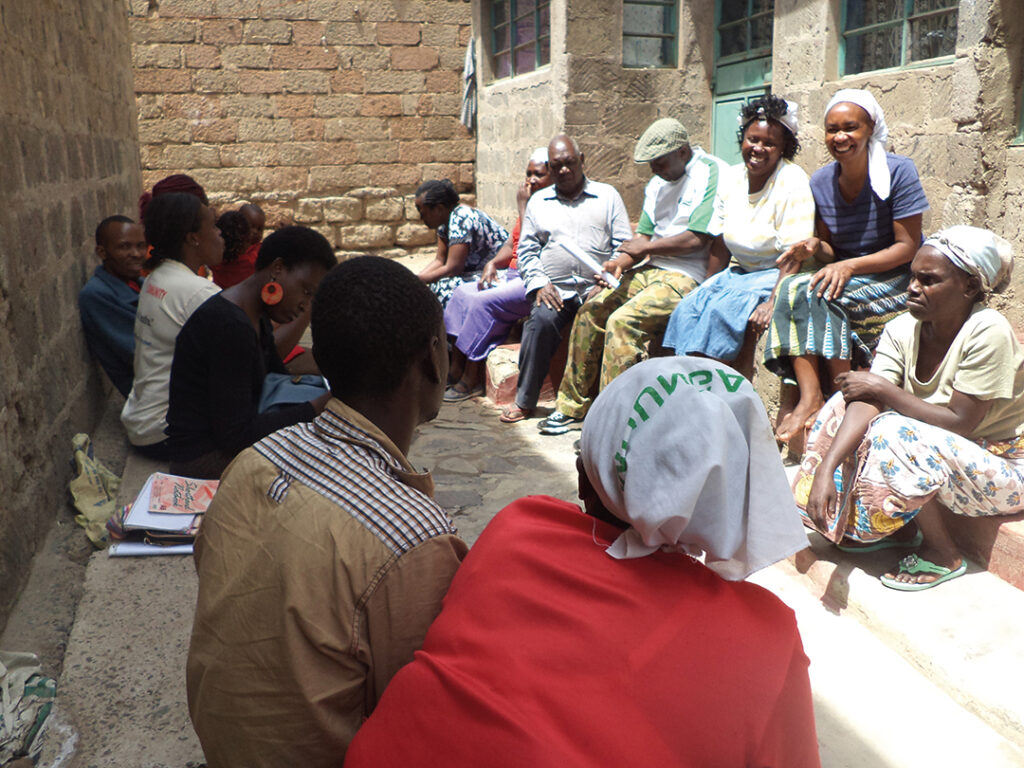
Hospitality as a Framework for Mission in Africa
Emphasizing that all human beings are created in the image of God, Nostra Aetate, §1 underlines our common origin and destiny. This perspective and the understanding of divine hospitality through the incarnation, lead to a human hospitality which promotes peace and justice. In the New Bible Dictionary (1999:485), the Greek term used for hospitality is philoxenia—love for strangers. Heb 13:2 demands that Christians show hospitality toward strangers. The kenosis of Christ exemplifies a way of transcending oneself, following His example of openness, establishing relationships, and welcoming others.
In most African cultures, hospitality is a value. During my two years of pastoral experience as a student of the Missionaries of Africa in Mali among the Bambara people, I realised that hospitality was based on humanity, and not on religion, race, or gender. In Southern Africa, it is underpinned by the concept of ubuntu, which underlines human relationships and interconnectedness. Christianity and African cultures value hospitality, which becomes an incentive for African Christians to promote peace, justice, and unity among human beings, leading the Church to be an authentic prophetic witness to God’s love and to participation in God’s mission.
According to Paul VI, the Good News is proclaimed through two fundamental commands: “Put on the new self” and “Be reconciled to God” (EN 2). Proclaiming the Good News in words or deeds invites us to self-emptying of the old self and transformation to a new inner self which listens to God, is in perpetual communion with Him and in a transformative relationship with all people. Our response to God’s hospitality—revealed across cultures and religions—determines our own hospitality, our Christian attitudes toward others and our way of being in the world.
When oppressive structures are challenged, new life and hope are experienced together with a true sharing of Christ’s love.
Pope Francis asserts that mission demands great generosity on our part (EG 12). Prophetic witness demands true hospitality— which mirrors the divine one—underpinned by humility. This enables us to move “from a pastoral ministry of mere conservation to a decidedly missionary pastoral ministry” (EG 15) that deals with concrete African realities. It calls for a shift from an African pastoral ministry of maintenance to a prophetic witness that respects human dignity. Pope Francis (EG 24) emphasises that communities that get involved by word and deed in people’s daily lives, bridge distances, are willing to abase themselves, and embrace human life, touching the suffering flesh of Christ in others, take on the “smell of the sheep.”
African mission today needs to promote the radical kenosis of the Church in view of her prophetic witness. She must express radical humility beyond selfish desires and ambitions of remaining in familiar comfort zones. In being Christocentric, she must be human-centred. She must be bold in her prophetic voice—which brings along challenges—not preoccupied with maintaining numbers or competing with other denominations or religions. This kenosis will help the Church in Africa to become more hospitable to all, especially to the last, the lost, and the least of society.

